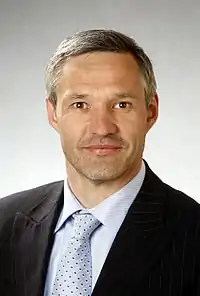Erki Nool
Erki Nool (born 25 June 1970, in Võru, Estonia) is an Estonian decathlete and former politician.
 Nool in 2011 | |||||||||||||||||||||||||||||||||||||||||||||||||||
| Personal information | |||||||||||||||||||||||||||||||||||||||||||||||||||
|---|---|---|---|---|---|---|---|---|---|---|---|---|---|---|---|---|---|---|---|---|---|---|---|---|---|---|---|---|---|---|---|---|---|---|---|---|---|---|---|---|---|---|---|---|---|---|---|---|---|---|---|
| Full name | Erki Nool | ||||||||||||||||||||||||||||||||||||||||||||||||||
| Born | 25 June 1970 Võru, Estonia | ||||||||||||||||||||||||||||||||||||||||||||||||||
| Height | 1.84 m (6 ft 0 in) | ||||||||||||||||||||||||||||||||||||||||||||||||||
| Weight | 84 kg (185 lb) | ||||||||||||||||||||||||||||||||||||||||||||||||||
| Sport | |||||||||||||||||||||||||||||||||||||||||||||||||||
| Country | |||||||||||||||||||||||||||||||||||||||||||||||||||
| Sport | Track and field | ||||||||||||||||||||||||||||||||||||||||||||||||||
| Event(s) | Decathlon | ||||||||||||||||||||||||||||||||||||||||||||||||||
| Achievements and titles | |||||||||||||||||||||||||||||||||||||||||||||||||||
| Personal best(s) | 8815 NR (Edmonton 2001) [1] | ||||||||||||||||||||||||||||||||||||||||||||||||||
Medal record
| |||||||||||||||||||||||||||||||||||||||||||||||||||
Life and career
Nool grew up in an impoverished environment in the southern part of Võru. His father was a worker in a furniture factory and his mother was in charge of the finances of a school. There were six children, with Erki the third youngest. When he was 13, from the suggestion of his father he moved to a sports-focused boarding school, where he could eat a free warm meal three times a day.[1]
In those days the economy was in a poor condition. When traveling to over-seas competitions, they didn't get their own cabin in the cruise ship, but instead just slept in the hallways and then competed and trained the next day. They also didn't have indoor athletics training facilities for winter. Nool was brought to tears when he was gifted a new, pristine pair of sneakers. [1]
After Estonia became independent on 20 August 1991, Nool was vocal about his dream of competing in the Olympics as part of the Estonian team. He took part in the Barcelona 1992 Summer Olympics decathlon but he ended up having to stop and pull out.[1] Little by little he developed and by the mid-1990s he was among the top athletes in decathlon.[1] In September 1997 he founded his own sports club and in 1998–2009 he organized international decathlon competition "Reval Hotels Cup".[2]
When he won gold for decathlon at the 1998 Budapest European Championships, he became a sports hero. Two years later, when he won the gold medal for decathlon in the 2000 Summer Olympics in Sydney, he became a national hero.[1] Although Nool did not place first in any individual event, his total score was the highest. There was a dramatic moment in discus throw, but luckily the competition referee decided to over-rule a judge, who had red-flagged his last and only valid attempt due to alleged step-out. The reinstatement of his 43.66-metre third throw sparked unsuccessful counter-protests from other teams. Nool took gold ahead of the Czech Roman Šebrle and American Chris Huffins. [3][4]
He has been voted as Estonia's sexiest man and in the 2000s the most popular Estonian.[1] In 2006, Nool participated as a celebrity contestant on the first season of Tantsud tähtedega, an Estonian version of Dancing with the Stars. His professional dancing partner was Ave Vardja.[5]
2005–2017, Erki Nool was the Vice Chairman of the EOC Athletes Commission and 2007–2011 member of the European Athletics Development Committee. 2008–2012, he was also member of the executive committee of the Estonian Olympic Committee.[2]
On 4 March 2007, Nool was elected to the Estonian Parliament, the Riigikogu, representing the Union of Pro Patria and Res Publica.[6] He has since left politics and now focuses on his real estate business and athletics school, with 450 students.[1]
His son Robin Nool (born in 1998) is pole vaulter with a record of 5.40 m.[1][7]
Achievements
References
- Silvennoinen, Santtu (25 June 2020). "Kun köyhä Erki rantautui Suomeen, KGB oli kintereillä – tamperelaisen rakennusmestarin upea teko sai itkun silmään: "Virolaisia luultiin varkaiksi"". Iltalehti. Retrieved 25 June 2020.
- "Erki Nool's sports biography". esbl.ee.
- "Täna 20 aastat tagasi tuli Erki Nool Sydney olümpiavõitjaks". ERR. 28 September 2020.
- "Täna 20 aastat tagasi: Erki Nool tuli Sydney olümpiavõitjaks". Eesti Kergejõustikuliit. 28 September 2020.
- "Nool ja Vardja langesid tantsusaatest välja". Postimees. 20 November 2006.
- "Erki Nool politician career on Riigikogu.ee". Riigikogu.
- "Robin Nool". World Athletics. Retrieved 25 January 2022.
External links
- Erki Nool at World Athletics
- Evans, Hilary; Gjerde, Arild; Heijmans, Jeroen; Mallon, Bill; et al. "Erki Nool". Olympics at Sports-Reference.com. Sports Reference LLC. Archived from the original on 17 April 2020.